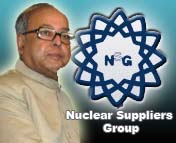Indian minister rejects conditions for nuclear waiver
 New Delhi - India will not accept any preconditions to get an exemption from the Nuclear Suppliers Group (NSG) to implement the India-US civil nuclear energy deal, Foreign Minister Pranab Mukherjee said Saturday.
New Delhi - India will not accept any preconditions to get an exemption from the Nuclear Suppliers Group (NSG) to implement the India-US civil nuclear energy deal, Foreign Minister Pranab Mukherjee said Saturday.
"We have to see what kind of amendments come. Then only we can decide. But we cannot accept prescriptive conditionalities," Mukherjee told the PTI news agency during a tour to the eastern state of West Bengal.
The minister was asked about reservations expressed by member countries at a suppliers' group meeting in Vienna which could lead to a re-wording of the US proposal for trade exemption.
An NSG clearance of the landmark nuclear deal is crucial to enable India to trade in fissile materials and technology with US and other nuclear-exporting countries.
The two-day NSG meeting ended Friday without a consensus on allowing nuclear trade with India. A new round of talks is planned for early September.
The decision was delayed as 20 member countries sought to amend the US proposal.
Mukherjee's comments also came after a US official said Washington anticipated some changes in the text of the draft waiver.
"There may be changes in the text. But we will not allow any changes that will impede the process or block cooperation," US Assistant Secretary of State Richard Boucher was quoted as saying in an interview with NDTV news channel.
India has repeatedly said that it wants a clean waiver by the NSG and would not be open to any changes.
Foreign Secretary Shiv Shankar Menon, who attended the Vienna meeting, went to Washington for talks with US officials on the India-specific waiver, the IANS news agency reported.
Approving exports for India's growing nuclear power programme is part of Washington's 2005 nuclear deal with New Delhi, which the US administration wants Congress to ratify before the presidential elections.
Under the deal, India already agreed to separate its nuclear bomb programme from its energy sector, and to allow the International Atomic Energy Agency to inspect civilian reactors. (dpa)